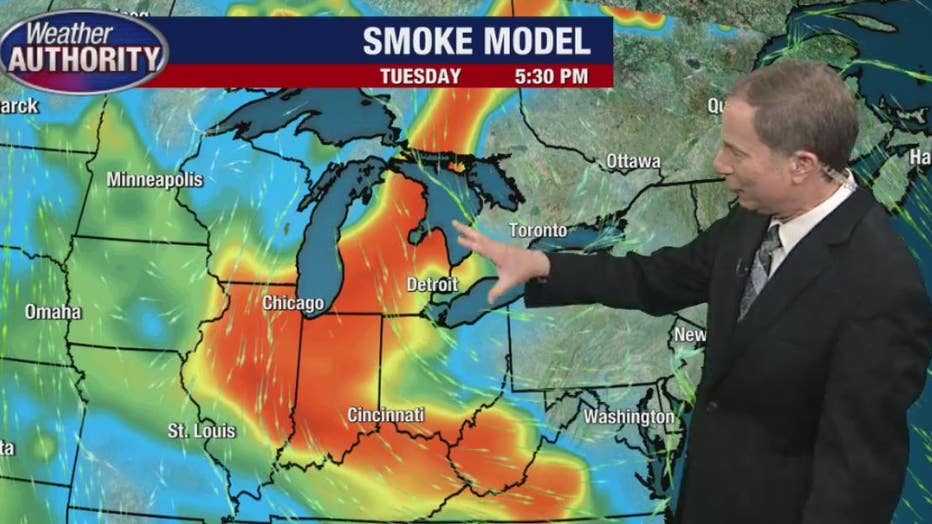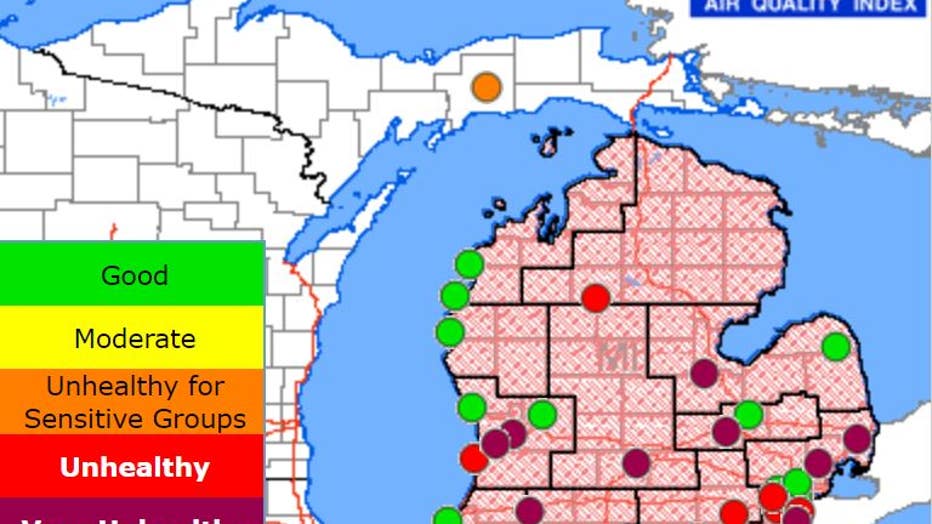Michigan Air Quality Alert: Tips for staying healthy as wildfire smoke fills air
Air Quality Alert remains in effect for Metro Detroit
Wildfire smoke continues to blanket the area, with an Air Quality Alert remaining in effect through Wednesday. Alan Longstreet has your full forecast.
FOX 2 (WJBK) - An Air Quality Alert is in effect for Michigan until Wednesday due to smoke from the Canadian wildfires.
Pollutants are expected to be in the unhealthy for sensitive groups to unhealthy range by The Michigan Department of Environment, Great Lakes, and Energy. Smoke from wildfires in Quebec, Canada, is currently impacting PM2.5 concentrations at the surface across much of the state of Michigan and will continue through Wednesday, June 28th, according to the National Weather Service.
The average air quality is expected to fluctuate between unhealthy for sensitive groups to unhealthy for everyone with the possibility of the Upper Peninsula and northern Lower Peninsula experiencing some hours when concentration cause the Air Quality Index to be very unhealthy or hazardous for everyone.
FOX 2 Weather Authority Rich Luterman said the alert could be extended through Thursday as well.
Residents are advised to reduce or eliminate activities that contribute to air pollution, such as outdoor burning, and use of residential wood-burning devices.
Keep windows closed overnight to prevent smoke from getting indoors and, if possible, run central air conditioning with MERV-13 or higher-rated filters.
Protecting your heath during smoke events:
Anyone can get sick from exposure to wildfire smoke but some people are more sensitive to particle pollution. Older adults aged 65 and older, pregnant people, children and people with lung and heart conditions may be more likely to get sick if they breathe in wildfire smoke.
Symptoms from breathing in particle pollution from wildfire smoke can include wheezing, coughing and shortness of breath. If you have asthma, follow your asthma control action plan or contact your health care provider if you have symptoms. If you have heart disease and experience these symptoms, contact your healthcare provider.

The most protective option when air is unhealthy for you is to stay indoors with air conditioning, reduce strenuous activities and limit outdoor activities. If you have to be outside, N95 masks offer enhanced protection when used according to product instructions.
During unhealthy for sensitive groups (AQI orange) to unhealthy for everyone air quality events (AQI red), the Michigan Department of Health and Human Services (MDHHS) advises the following:
For people with heart or lung disease, pregnant people, older adults aged 65+, children and teens it is suggested to take the following steps to reduce exposure:
- Avoid strenuous outdoor activities.
- Keep outdoor activities short.
- Consider moving physical activities indoors or rescheduling them.
For everyone else:
- Choose less strenuous activities (like walking instead of running) so you don’t breathe as hard. ‘
- Shorten the amount of time you are active outdoors.
- Be active outdoors when air quality is better.
During very unhealthy or hazardous for everyone air quality (purple to maroon Air Quality Index levels), MDHHS advises the following for everyone:
- Stay indoors with the doors and windows closed using MERV-13 or better air filtration.
- Seek shelter elsewhere if you do not have an air conditioner and it is too warm to stay inside with the windows closed. Call or text 211 or contact your local health department to find out if there is a shelter or cooling center nearby.
- Use air filters to improve indoor air quality. Whether you have a central air conditioning system or a portable room unit, use high efficiency filters to capture fine particles from smoke. If you don’t have access to those filter systems, you can create a temporary air purifier with a 2012 or newer box fan and attaching a MERV-13 or higher air filter to it. Information is available online.
- Keep activity levels low.
- Avoid outdoor activities.
- Use N95 style masks if you have to be outside.Surgical and cloth masks are not recommended as they are not designed to prevent breathing in the fine particulate matter in wildfire smoke.


